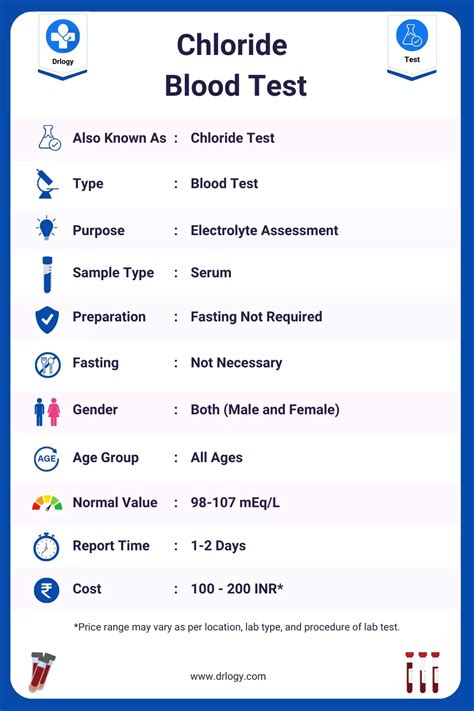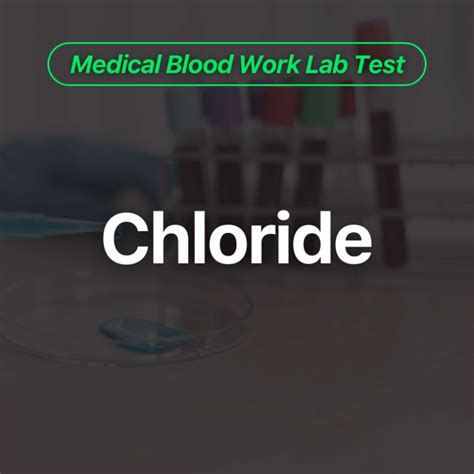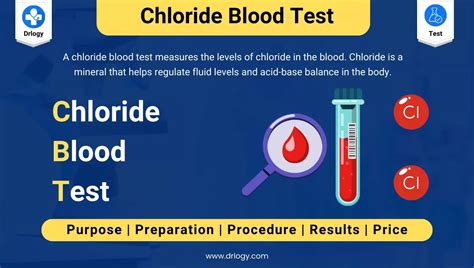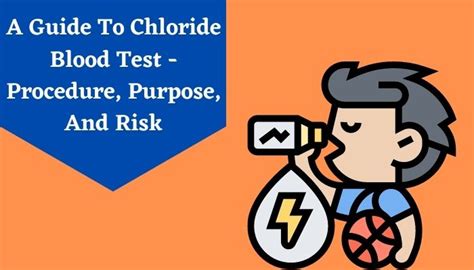Intro
Discover the Chloride Blood Test, a diagnostic tool measuring electrolyte levels, including chloride, sodium, and potassium, to diagnose imbalances, kidney function, and metabolic disorders, providing insights into overall health and guiding treatment decisions.
The human body relies on a delicate balance of various substances to function properly, and one of the key components is chloride. Chloride is an essential electrolyte that plays a crucial role in maintaining fluid balance, nerve function, and muscle contractions. A chloride blood test is a diagnostic tool used to measure the levels of chloride in the blood, helping healthcare professionals to diagnose and monitor various medical conditions. In this article, we will delve into the world of chloride blood tests, exploring their importance, working mechanisms, and key information related to this topic.
Chloride is a vital electrolyte that is found in the blood, and its levels can fluctuate due to various factors, including dietary intake, kidney function, and hormonal imbalances. A chloride blood test is typically performed to diagnose and monitor conditions such as kidney disease, respiratory problems, and hormonal imbalances. The test can also help healthcare professionals to assess the effectiveness of treatments and make informed decisions about patient care. With the help of a chloride blood test, healthcare professionals can identify potential health issues early on, allowing for prompt intervention and prevention of complications.
The importance of chloride blood tests cannot be overstated, as they provide valuable insights into the body's electrolyte balance and overall health. By measuring the levels of chloride in the blood, healthcare professionals can diagnose a range of medical conditions, from mild electrolyte imbalances to life-threatening diseases. Furthermore, chloride blood tests can help healthcare professionals to monitor the progression of diseases and adjust treatment plans accordingly. Whether you are a healthcare professional or simply interested in learning more about chloride blood tests, this article aims to provide a comprehensive overview of this topic, exploring its benefits, working mechanisms, and key information related to chloride blood tests.
What is a Chloride Blood Test?

How Does a Chloride Blood Test Work?
A chloride blood test works by measuring the levels of chloride in the blood using specialized equipment. The test is based on the principle of ion-selective electrodes, which are designed to detect specific ions in the blood. In this case, the electrode is designed to detect chloride ions, which are then measured and reported as a concentration in the blood. The results of the test are usually expressed in units of milliequivalents per liter (mEq/L) or millimoles per liter (mmol/L).Benefits of a Chloride Blood Test

The benefits of a chloride blood test are numerous, and the test can provide valuable insights into the body's electrolyte balance and overall health. By measuring the levels of chloride in the blood, healthcare professionals can diagnose and monitor a range of medical conditions, from mild electrolyte imbalances to life-threatening diseases.
What Do the Results of a Chloride Blood Test Mean?
The results of a chloride blood test can provide valuable insights into the body's electrolyte balance and overall health. The normal range for chloride levels in the blood is typically between 96 and 106 mEq/L, although this can vary slightly depending on the laboratory and the individual. Abnormal results can indicate a range of medical conditions, including kidney disease, respiratory problems, and hormonal imbalances.How to Prepare for a Chloride Blood Test

By following these steps, you can help to ensure accurate results and make the testing process as smooth as possible.
What to Expect During a Chloride Blood Test
During a chloride blood test, a healthcare professional will collect a blood sample from a vein in your arm. The process is relatively quick and painless, and you can expect the following: * The healthcare professional will clean the area where the blood sample will be taken * The healthcare professional will insert a needle into the vein and collect a blood sample * The blood sample will be sent to a laboratory for analysis * The results of the test will be available within a few hoursThe entire process usually takes less than 30 minutes, and you can expect to receive the results of the test within a few hours.
Risks and Complications of a Chloride Blood Test

These risks are relatively rare, and the benefits of a chloride blood test usually outweigh the risks. However, it is essential to discuss any concerns or questions with your healthcare professional before the test.
Common Questions About Chloride Blood Tests
Here are some common questions about chloride blood tests: * What is a chloride blood test used for? * How is a chloride blood test performed? * What are the normal ranges for chloride levels in the blood? * What do abnormal results mean?These questions can provide valuable insights into the world of chloride blood tests, and the answers can help to alleviate any concerns or questions you may have.
Conclusion and Next Steps

We encourage you to share your thoughts and experiences with chloride blood tests in the comments section below. Your feedback and insights can help to educate and inform others about the importance of this diagnostic tool. Additionally, if you found this article informative and helpful, please share it with others who may benefit from this information.
What is the normal range for chloride levels in the blood?
+The normal range for chloride levels in the blood is typically between 96 and 106 mEq/L, although this can vary slightly depending on the laboratory and the individual.
What are the benefits of a chloride blood test?
+A chloride blood test offers several benefits, including diagnosis and monitoring of kidney disease, diagnosis and monitoring of respiratory problems, assessment of hormonal imbalances, monitoring of electrolyte balance, and early detection of potential health issues.
How is a chloride blood test performed?
+A chloride blood test is typically performed using a blood sample, which is collected from a vein in the arm. The blood sample is then sent to a laboratory for analysis, where the levels of chloride are measured using specialized equipment.
